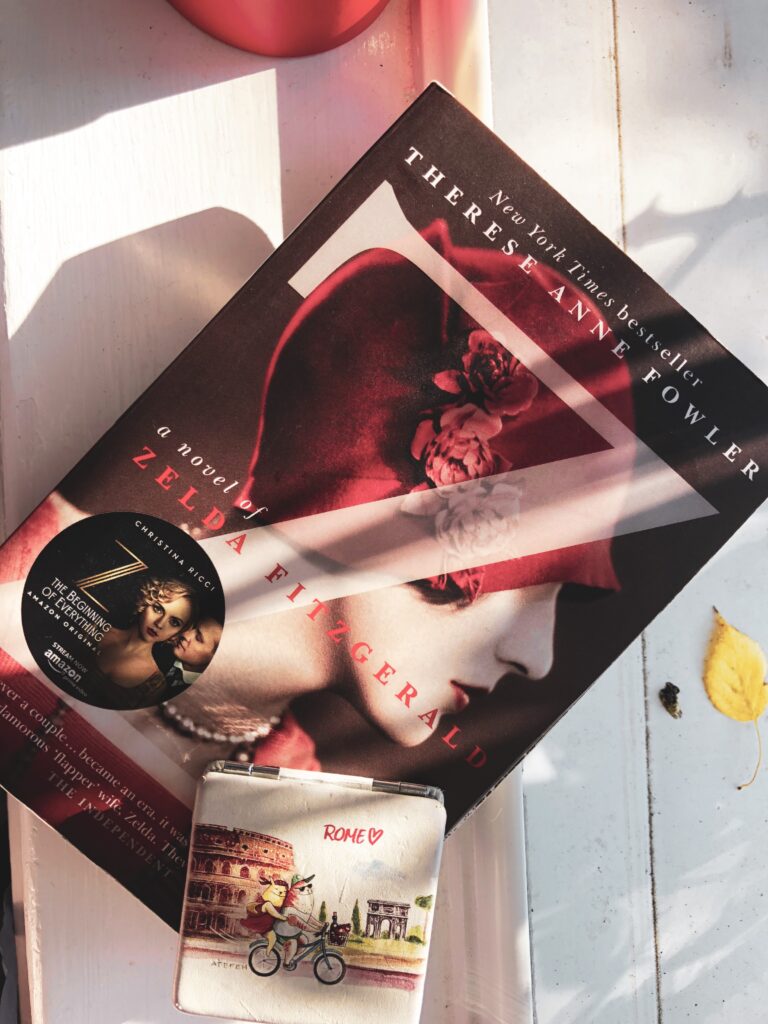Deliciously addicting, full of juicy bits and covered in jazz age sprinkles.
I picked this one up at one of my favourite bookstores for vintage/preowned books — The World’s End in Chelsea. Having seen the first season of Zelda on Amazon Video, I was definitely curious to read the book that inspired it, and this pleasant surprise manifested itself while I was browsing on a lonely (as in: major me-time) Saturday afternoon.
Loneliness would be a theme of the book itself (but the non me-time kind) — something that we’ve become to expect from it-couples that spend their prime in the limelight. Here, the author shows us the glamour, the parties, the champagne, the New York, the Paris, the Milan of the early 20th century, and behind all that: the Fitzgeralds and their less than perfect marriage. A love story immortalised in novels, written by a man consumed by alcohol and lust. Lust for love, for fame and for immortality. Behind this great man, of course, was his muse — the one that we know as Daisy, as Rosalind, and maybe the least, as Zelda Seyre.
“Just don’t forget your lines.”
“Which lines?”
“That you did it all in order to win me.”
The enigma surrounding Scott and Zelda is probably why we are still so interested in their life even today, long past the roaring twenties. Or, well, I am interested.
The story is, naturally, told from Zelda’s point of view, which is quite refreshing considering how many accounts of the times we have from male perspective. Most prominently:
- Hemingway’s A moveable feast. For me, this is a great book telling the story of his times in a great city. Paris in the twenties, conversations with Joyce, Fitzgerald and his manhood — what’s not to love?
- Then there are Scott’s many accounts manifesting themselves in the form of letters and short stories — not to mention his novels, borrowing from real life events. Looking at you, Tender is the Night.
As for the women? Years later came The Paris Wife that I read probably as quickly as Z, and thoroughly enjoyed. The story of Hemingway’s first wife, Hedley, told from her point of view and based on true events, aims to give an insight into what living with Ernest was really like. It’s about living with Ernest the writer, the war veteran, the womaniser, the flirt, the lover, the insecure man, the narcissist, the hunter (of course, always keeping in mind this is still a historical fiction and not a memoir or biography).
“This was Scott. This is Scott, always looking back to try to figure out how to go forward, where happiness and prosperity must surely await.”
Z is a book just like that — the story coming from the woman that was there next to the hero, the idol and the legend. Forever cursed to live in his shadow, she was the muse but not the artist. Until maybe she was an artist in her own right: a painter, a writer, a ballet dancer. A woman whose potential wasn’t fully developed — sadly, neither was Scott’s and this is where the tragedy seems to hit the hardest.
As it happens, neither of the two accounts come straight from the woman herself, and therefore it’s safe to say you have to take most dialogues with a pinch of salt. All adding to that all important extra flavour that we need with our morning coffee. (A needed disclaimer considering the amount of people who wrongly take fiction as facts. Same, by the way, definitely goes for the accounts we are getting from Ernest and Scott — after all, being objective doesn’t always make for great literature. Plus, even personal correspondence can be effected by one’s ego).

Back to the book, historical inaccuracies aside, it’s a great read. Unputdownable almost. Following the events from Zelda’s youth, the moment she met Scott, their wedding, and their life spanning across continents and heartbreaks, Z swiftly takes us through the journey of a couple whose lifestyle feels as gripping today as it did a hundred years ago.
The one flapper you were taught to hate might just be able to charm you too
It doesn’t paint a great picture of Scott. To be fair, it would be really hard to paint one — especially from the perspective of his wife. He is one of my favourite authors in the world for so many reasons, yet he was hardly a man to look up to, considering how easily he gave in to his vices.
However, Hemingway is even worse — so bad, in fact, even his literary qualities can hardly compensate for his lack of morals in real life, as presented in this book. It’s exaggerated of course, but his character is not that hard to be believable. After all, still to this day no one is entirely sure why Hemingway and Zelda disliked each other quite this much; a hatred almost as well documented as the love between Zelda and Scott. The proposed resolution in this book is a bit farfetched for my taste, and probably one of the not-so-many things I would change about it.
Would I recommend it? Yes. It’s well written and well researched, offering a flirty look into the jazz age, but not just that — the optimism of a young couple, the dreams of a young man heading to immortality, the ups and downs of a doomed marriage, and the love, the love, the love that defined literature, a city and a whole age.
Z: A novel of Zelda Fitzgerald is best enjoyed…
…this side of paradise. Z: A novel of Zelda Fitzgerald is equally well enjoyed with a coffee in a cosy cafe house as it is casually lounging in the sun, catching those long awaited sunrays with massive sunglasses taking care of covering your eyes.
